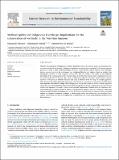Wetland spirits and indigenous knowledge : implications for the conservation of wetlands in the Peruvian Amazon
Abstract
Globally, the importance of indigenous and local knowledge systems for science, policy, environmental conservation and the cultural heritage of indigenous peoples is increasingly being recognised. The Amazon region in particular is home to many indigenous peoples who have conserved their cultural traditions and knowledge, despite growing threats to the environment and traditional lifestyles and cultures. Based on insights from ethnographic research in three indigenous communities, here we present a case study on the indigenous knowledge of the Urarina people of the Chambira Basin in the Peruvian Amazon and its implications for conservation. We describe, for the first time, a series of anthropomorphic and territorial “wetland spirits”, who are associated with particular wetland ecosystems and range in character from the benign to outright aggressive. Their presence may indirectly benefit conservation of wetlands, as humans fear or respect these wetland spirits and adapt their behaviour accordingly. While benign spirits may be seen as positive models to follow, aggressive spirits may deter unsustainable harvesting of resources through fear of disease or death. However, their cultural status is not adequately captured by such rational-scientific explanations. Wetland spirits are important characters within the indigenous cosmos of humans and non-humans, which is built on a relational, rather than extractive model of connecting humans and nature. We discuss our findings in the context of wider conceptual debates on recognising relational ontologies in environmental policy and conservation, the paradigm of biocultural conservation, as well as their implications for land titling, and incorporating indigenous perspectives in local education.
Citation
Fabiano , E , Schulz , C & Martín Brañas , M 2021 , ' Wetland spirits and indigenous knowledge : implications for the conservation of wetlands in the Peruvian Amazon ' , Current Research in Environmental Sustainability , vol. 3 , 100107 . https://doi.org/10.1016/j.crsust.2021.100107
Publication
Current Research in Environmental Sustainability
Status
Peer reviewed
ISSN
2666-0490Type
Journal article
Description
Funding: Emanuele Fabiano acknowledges funding from trAndeS (initials in Spanish), the Graduate Programme in Sustainable Development and Inequalities, a joint initiative by the Free University of Berlin (FU Berlin) and the Pontifical Catholic University of Peru (PUCP), for the project “Sustainable development, traditional ecological knowledge and social inequality in the region of the Chambira River in Loreto”.Collections
Items in the St Andrews Research Repository are protected by copyright, with all rights reserved, unless otherwise indicated.

